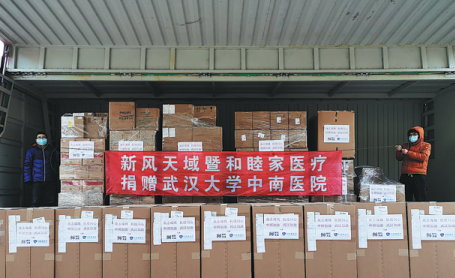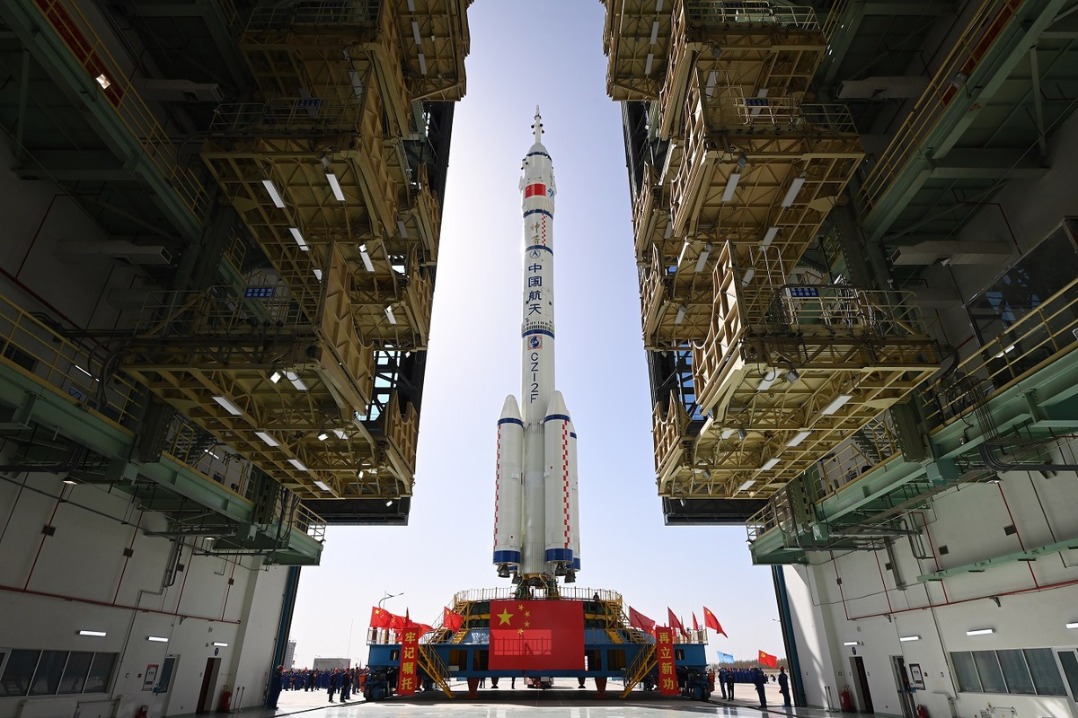Company donations boost anti-virus battle
By Zhou Wenting | China Daily | Updated: 2020-03-11 09:08

Medical supplies donated by United Family Healthcare, an international hospital, arrive in Wuhan last month. CHINA DAILY
In addition to dispatching medical workers to the front line to support Wuhan, Hubei province, some privately owned and foreign-invested hospitals are helping to battle the novel coronavirus in other ways.
They include the donation of medical supplies, provision of psychological counseling, and providing consulates and businesses with infection-prevention training.
United Family Healthcare, an international company that owns a network of clinics nationwide, has donated 1,000 sets of protective medical clothing, 50,000 N95 face masks, nearly 4,000 sets of goggles and more than 1.5 million pairs of disposable gloves.
The company has also provided about 30 invasive and noninvasive respirators and related equipment.
To obtain the items, UFH urgently explored all possible supply channels around the globe.
The first batch of donations was purchased in late January, shortly after the outbreak was announced, and the respirators were transported to front-line hospitals in Wuhan, the epicenter of the outbreak, within 10 days.
"The decision about what to donate was based on the hospital's experience of dealing with public health incidents, and some of our doctors participated in treating SARS (severe acute respiratory syndrome) patients in 2003," said Liu Wenjing, communication director of UFH.
The company opened its first hospital in Beijing in 1997, and was designated to screen expats during the 2003 SARS outbreak.
Wuhan's announcement regarding the construction of Leishenshan Hospital in late January and the realization that the number of patients in critical condition could potentially be extremely high made UFH aware that local hospitals would have high demand for respirators, she said.
"We also chose gloves made of rubber and designed for medical purposes rather than ordinary surgical ones, because the former are thicker and provide better protection," she said.
Liu added that UFH is working to purchase and transport more medical materials to front-line hospitals.
UFH has also prepared a team of about 80 volunteer doctors and nurses to support Wuhan, and said it obtained a response from the National Health Commission on Feb 24, stating that the first four-strong team would be dispatched soon.
Meinian OneHealth Healthcare Group, a private domestic medical institution, joined hands with Jiangsu Bioperfectus Technologies Co, which manufactures molecular diagnostic products, and donated 46,000 nucleic acid test kits for virus detection to Hubei on Jan 27.
Yichang and Xiangyang each received 5,000 sets, while other places in Hubei-including Huanggang, Xiaogan, Ezhou, Jingmen, Shiyan, Enshi and Jingzhou-received 3,000 kits each, which helped alleviate a shortage of equipment in the province.
Meinian OneHealth Healthcare has also collaborated with Dr. Elephant, an online medical care platform in Shanghai, and Luye Medical (both privately owned) and started a phone hotline providing psychological counseling to medical and other workers on the front line. The hotline can also be used by confirmed patients and their families, suspected cases in quarantine and residents of locked-down cities who are experiencing anxiety and depression.
Nearly 80 experienced counselors, including some who provided psychological assistance to survivors of the 2008 Wenchuan earthquake in Sichuan province and the 2011 rail accident in Wenzhou, Zhejiang province, are providing free services via the hotline.
UFH is also offering screening services and emergency treatment around the clock at its hospitals and clinics nationwide.
During the Spring Festival holiday, UFH facilities in Beijing and Shanghai received hundreds of patients, including children who had been scratched by pets and needed urgent vaccination, seniors with acute cardiac symptoms and people who had fevers but were not infected with the coronavirus, the hospital said.
"Some of our facilities were also designated as fever clinics by the health authority. We provided screening, tests and diagnosis, and were responsible for transporting confirmed patients to designated hospitals," Liu said.
SinoUnited Health Clinic, a private medical institution where expats account for more than half the regular patients at its five branches in Shanghai, said it has introduced a string of measures to guarantee continuity of services during the outbreak.
They include medical consultations via phone calls and WeChat, setting up online chat groups to connect pediatricians to families with children, and providing advice about diets and handling the disease. In addition, they offer online advice about home isolation and personal hygiene for expats, who may not be as well-informed as local people, the clinic said.
On Feb 13, SinoUnited Health was invited to visit the Consulate General of Italy in Shanghai and provide professional advice on preventing infection.
Yao Lili, a doctor who specializes in infection prevention, and her team were shown around each work unit by Michele Cecchi, the consul general.
Later, they discussed matters that required attention-including the use of air conditioning, ventilation, restrooms and elevators-with Chinese and expat workers, property managers and cleaners.
Yao also demonstrated the correct procedure for the removal of contaminated gloves.























